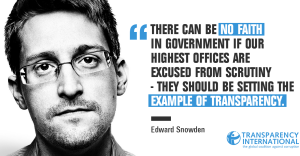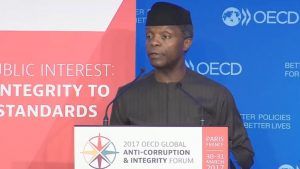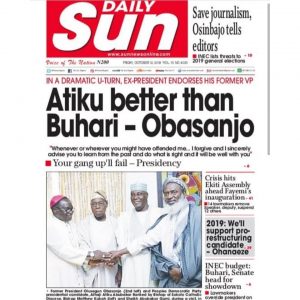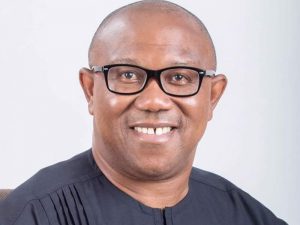 This is the second of a series of reports on power and probity in the aftermath of May 2019 when there should be new members of the elite in government across Nigeria. Probity has remained a key agenda in Nigerian politics since 1999. But, fighting corruption has, especially with the setting up of the Economic and Financial Crimes Commission, (EFCC) in 2003, increasingly relied on coercive power to the virtual exclusion of inter-subjective understanding and determination of corruption.
This is the second of a series of reports on power and probity in the aftermath of May 2019 when there should be new members of the elite in government across Nigeria. Probity has remained a key agenda in Nigerian politics since 1999. But, fighting corruption has, especially with the setting up of the Economic and Financial Crimes Commission, (EFCC) in 2003, increasingly relied on coercive power to the virtual exclusion of inter-subjective understanding and determination of corruption.
This report seeks to correct that by privileging the probity sensibility of selected presidential candidates who would occupy the most important space where allocation of public resources would take place – The Presidency. It is about that office that the probity and accountability sensitivity of the candidates of the two leading parties are being established in terms of what they have ever said as well as what have been said about them on, about, for and against corruption. As such, this report becomes a study in consciousness based substantially on self-reporting. The importance of the study lies in the co-constitutive role of consciousness or the human agency and, therefore, the need to focus on the sensibility of the individuals vis-a-vis the programme of mainstreaming probity consciousness in Nigeria.
What Did We Do and How Did We Do It?
Establishing the corruption and probity sensibility of contestants by turning on corruption reporting entails meaning making. This is because no statement has a static meaning outside of time and space or what happened before, during and after the statement. But, what happened before, during and after a statement is not contained in the statement itself. It is only a reader or a listener or a viewer who can supply that. As such, meaning lies with readers/listeners/viewers, not with writers/broadcasters/reporters.
This means that to construct the profile of presidential candidates in the February 16th, 2019 election from the mass of media reporting of their statements and statements on them in relation to power and probity, this project needed readers trained to supply the unsaid. In other words, this report is a subjective but critical process. That is, critical not as in criticizing or condemning but in situating each media report on each of the names so as to determine what it speaks to, individually and thematically.
The project had started first with compiling the media reports by ransacking libraries and other documentation centres for newspapers, magazines and related texts on corruption reporting. It was in doing so that researchers found 13 Years of Military Rule, edited by James Ojiakor as a publication of the now defunct Daily Times very helpful in terms of the details of the 1975/6 purge directed at corruption. The compilation got more interesting as it got to the more recent corruption reporting from 1999 to date: from the birth of the EFCC to the rash of impeachment of elected governors between 2004 and 2006 to the sale of State Owned Enterprises, (SOEs) from 2002 to 2007, especially banks, NITEL, hotels and the power sector, among others; the era of the ‘cabal’ and the exile of Nuhu Ribadu, the anti-corruption czar in the wake of the Umaru Yar’Adua regime; the coming of the Dr Goodluck Jonathan Presidency between 2011 to 2015 and the last four years under the Buhari Presidency and controversies associated with loot recovery, convictions and contested neutrality of the war, etc privileged in the anti-corruption war. That compilation done, the team which accomplished it gave way to another team which had the tedious job of synthesizing the diverse compilation of media reporting on corruption into a more meaningful list.
It was this more systematized list that engaged the attention of discourse analysts. Although every item of corruption reporting was important and enriched this report, the paradox of the entire project is how so huge a chunk of the materials did not feature in the final report for two reasons. One is how bulky the report would become as to risk nobody reading it. The second is the need to illustrate the themes with most recent reports which most reader or today’s politicians can easily relate to. In other words, this is a highly condensed version of what we set out to do because, in the world of images, people rarely read anymore. Here it goes!
The Presidency:
Muhammadu Buhari of the All Progressives Congress, (APC):
Studied in terms of a selection of what he has ever said as well as what have been said about him on, about, for and against corruption, the following probity profile can be itemized:
- The paradox of incorruptibility: General Muhammadu Buhari has an unmistaken identity of an incorruptible public officer or political leader but General Buhari is referential in all the big instances of corruption allegations in the history of Nigeria. One, by virtue of his being the oil minister in the late 1970s, he was at the centre of the allegedly missing N2.8b in the early eighties. Two, he has always denied that there is anything called fuel subsidy beyond collective elite falsehood, a position considered insider’s view but, as president from 2015 – 2019, subsidy ran from billions under his predecessor to trillions in his last budget.
 Meanwhile, subsidy is the site of heaviest acts of corruption in Nigeria. Three, nobody has accused him of being directly involved in it but stories of aides and cronies entangled in suspicious deals abound, from Chief of Staff’s alleged MTN bribe, $25b NNPC contracts single handedly awarded; ex-Secretary to FG’s proven grass cutting corruption, condoning proven cases of graft such as Abdulrasheed Maina of pension. Each of these renders him vulnerable to charges of condoning large-scale corruption. The paradox is worth reflecting upon.
Meanwhile, subsidy is the site of heaviest acts of corruption in Nigeria. Three, nobody has accused him of being directly involved in it but stories of aides and cronies entangled in suspicious deals abound, from Chief of Staff’s alleged MTN bribe, $25b NNPC contracts single handedly awarded; ex-Secretary to FG’s proven grass cutting corruption, condoning proven cases of graft such as Abdulrasheed Maina of pension. Each of these renders him vulnerable to charges of condoning large-scale corruption. The paradox is worth reflecting upon. - A history of hyperactive re-statement of own innocence: A key sensibility is his persistent assertion of his innocence. In a June 16th, 2006 interview in Weekly Trust, he said “I was in charge of one of the most important ministries. There was a tribunal set up to inquire about the N2.8 billion missing then… There wasn’t anything found against me”, (p.5). In the same interview, he also said in respect of PTF as follows: I was a member of the National Council of State. …Obasanjo took a note …and there was something about corruption in the PTF and I challenged it. Luckily, the governor of Akwa Ibom State, Obong Victor Attah and the former governor of Ekiti State were contractors and consultants, respectively, with PTF. They came to my rescue and said no, there was no way government could lose money in PTF and no money was lost”. Does this attitude suggest anything beyond commonsense?
- Association with anti-corruption practices considered unorthodox: As military Head of State in the early eighties, he was comfortable with using serving military officers as heads of anti-corruption tribunals which were sentencing suspected crooks to jail terms of over 100 years. Most lawyers boycotted the tribunals. Back in power in 2015, he presided over invasion of the house of judges and the instrumentalisation of Executive Orders. Anti-corruption nobility or disguised vendetta tactics?
- Persistently linked to selectivity in prosecution of corruption suspects: In the mid eighties, the charge was the interpretation of corruption as something that politicians do as opposed to military, in or out of power. Between 2015 and 2019, the dominant charge has been that of shielding corruption suspects in his own party and government while persecuting members of other parties, especially the People’s Democratic Party, (PDP). The inference is that the following headlines point at the consistency of the perception: “PDP senators say Buhari’s anti-corruption crusade selective”, (Premium Times, August 6th, 2015); “Some Nigerians Question President’s Fight Against Corruption”, (VoA, November 16th, 2016); “Buhari’s anti-corruption war is selective – Clark”, (Punch, December 21st, 2016) and “APC using EFCC, ICPC against opposition – PDP”, (Premium Times, August 20th, 2018).


May 2016 in London where Nigeria got the rating of a fantastically corrupt country in the world
Anti-corruption war as hub of foreign policy exertions: 2015 to date has been a story of representation of Nigeria as corruption gone wild at many fora, be it at the G-7, at the 2016 London Anti-Corruption Summit, at United Nations General Assembly sessions or at the November 2018 Paris Peace Forum held on the sidelines of the Centenary of WW 1 Armistice. ThisDay, for instance, captured the exertion at the last UN General Assembly, (UNGA) as “Buhari Seeks Global Action Against Corruption”, (September 26th, 2018). The question is how well a president narrating his country in agreement with the hegemonic regime of representation of Nigeria as fantastically corrupt helps the country in the end since such narratives and the policy prescription they embody defines global geopolitics.
- Consistent zealot of anti-corruption wars: Irrespective of the contested meaning of fighting corruption, this remains a marker. As military Head of State, fighting corruption was the defining issue just as it is since 2015 to 2019. As at November 2016, 25 former ministers and ex-aides of Buhari’s predecessor, according to Sunday Punch, (Nov. 5th, 2016, p.3) were under investigation. “Fighting corruption is non-negotiable – Buhari” is how The Punch also put it in its Oct 4th, 2018 online edition. Similarly, Daily Trust tells us: We-can’t surrender to corruption – Buhari” This is in the online edition of its August 21st, 2018 edition. Is it the contradictions of fighting corruption or partisan politics that tends to crowd out the consistency?
- Temptation to anti-corruption triumphalism: In the past few years at least and, certainly as evidence of his overcoming of the shocker of his overthrow in 1985, candidate Buhari has begun to sound triumphalist about fighting corruption. On September 27th, 2018, virtually all media outlets in Nigeria, for instance, carried the story: Buhari claims victory in war against corruption”. Similarly, the US based broadcaster – CNBC – bought into this narrative with its April 30th, 2018 headline: Trump: President Buhari has substantially cut down corruption in Nigeria”. A critical October 8th, 2018 News 24 piece, however, relied on an AFP headline to sell triumphalism in “Muhammadu Buhari: Nigeria’s anti-corruption crusader”. It would be very interesting to see how far this triumphalism will be validated or challenged by what Transparency International or any other anti-corruption actors say about the corruption index in Nigeria under President Buhari.
 Prof Yemi Osinbajo, Vice-Presidential Candidate, APC
Prof Yemi Osinbajo, Vice-Presidential Candidate, APC
Studied in terms of a selection of what he has ever said as well as what have been said about him on, for, about and against corruption, the following profile can be itemized:
- Elite pressure as a roadblock to punishing the corrupt: Prof Osinbajo considers elite pressure on power as a problem in disciplining corruption suspects. The pressure not only comes from political, religious and traditional rulers, it comes in relentless phone calls. In “Religious leaders, traditional rulers frustrate action against corrupt individuals – Osinbajo”, (Vanguard, October 22, 2018), the Vice-President how he got such calls whenever he wanted to sack a public official who has been found to be corrupt. That is what he told the 24th Nigerian Economic Summit plenary on corruption and rule of law in Abuja. The significance is that Prof Osinbajo has a social understanding of the problems of fighting corruption, an understanding that has its own prescription, with particular reference to the role the power elite plays.
- Contested anti-corruption paradigm: This candidate’s anti-corruption paradigm is assessed to be one of sermonizing, an orientation which has been frequently attacked. “Stop sermonizing, answer your N33bn corruption allegation, PDP tells Osinbajo” ran one headline, (Vanguard, November 10th, 2018). An understandable arrow shot by the opposition People’s Democratic Party, (PDP), it speaks to the disappointment expressed by Prof Osinbajo’s critics who always refer to his being a pastor and a professor of law. Being a pastor and a professor of law is a key angle of Chief Obasanjo’s January 17th, 2019 open letter to President Buhari in which he expressed shock that Osinbajo was openly distributing ‘tradimoni’ across Nigeria.
- Attacked for corruption: No story illustrates this better than the one which went by these headlines in selected newspapers as follows: “NEMA probe: Osinbajo has case to answer”, (Vanguard, Nov. 14th, 2018); “IDP fund: You’ve questions to answer, Reps tell Osinbajo”, (The Punch, Nov. 14th, 2018); “NEMA: Reps insist Osinbajo has questions to answer”, (Daily Trust, Nov 14th, 2018). This was for what the House of Representatives called “illegal approval and disbursement of the N5.8 billion” to the National Emergency Management Agency (NEMA) on whose governing board Osinbajo sits as the Chairman although he gave the approval as Acting President. The legislature said approval of the sum without recourse to it was not only a breach of the law but that there were also “no records anywhere that this money was used for anything”.
Atiku Abubakar of the People’s Democratic Party, (PDP):
 Studied in terms of a selection of what he has ever said as well as what have been said about him on, for, about and against corruption, the following profile can be itemized:
Studied in terms of a selection of what he has ever said as well as what have been said about him on, for, about and against corruption, the following profile can be itemized:
- Atiku Abubakar’s self-understanding as an anti-corruption warrior: This candidate sees himself as a warrior against corruption. He says he will fight corruption better than President Muhammadu Buhari, Nigeria’s best known name with the most claim to corruption bashing, (Punch, Sept 12, 2017). He seeks to buttress such claim with mention of the arrest and trial of a former Inspector-General of the Police, dismissal of a minister and similar anti-corruption records of the Obasanjo regime in which he was the deputy. He argues that Nigeria has sunk into more corruption in the administration of President Buhari, (Premium Times, Sept 4th, 2018). Atiku has also come up with a list of 28 people he rates to be corrupt but working with President Buhari. That is to suggest that the president is not that disdainful of corruption as himself. Earlier on in 2006, he revealed details of transactions by then President Obasanjo, (see “What Obasanjo Got from Secret Account”, (The Nation, Sept 14th, 2006 front page lead). Still much earlier, he had been quoted as saying that looted funds were being recovered through negotiation rather than through legal means, (Nigerian Tribune, Sept 29th, 1999, front page story).
- Atiku Abubakar as a history of permanent embroilment in corruption controversies: The former Vice-President has been the most regular name in corruption controversies in the Fourth Republic, 1999 to date. Some of such controversies involve the privatisation exercise under the Obasanjo regime, the Petroleum Training Development Fund (PTDF)/Marine Float Account, (MOFAS) palaver between him and Chief Olusegun Obasanjo in 2006 and, recently, Bank PHB. As in the case of candidate Buhari, perpetual embroilment does not prove corruption but it raises question of how. Is this a case of being framed or a case of contradiction or both?
- Completely denies being corrupt: “I am not corrupt –Atiku” ran a Sept 4th, 2018 Premium Times headline in which he dismissed allegations of corruption against him on ground of lack of proof. The more instructive statement of his in this regard might be the October 9th, 2018 ThisDay report: Atiku: Buhari Would Have Arrested Me if I am Corrupt”.
-

One set of attackers
Incredible number of attacks/attackers in relation to corruption: Atiku is very vulnerable to a long list of attackers on corruption suspicion. The most recent and most worrisome too might be the Eurasia Group profiling of his presidential ambition as mission of gerontocratic self-enrichment and enrichment of cronies, a regime that would be vulnerable to rent-seeking determinism. In the story titled, “2019: Atiku must face corruption, integrity test – APC”, (Premium Times, Oct. 11th, 2018), the APC argued how no further proof of corruption is needed in relation to Atiku beyond Mr. Kola Ologbondiyan, the National Publicity Secretary of the PDP. The party said it was Ologbondiyan who, as an editor, published a Special Audit/Forensic Investigation of Petroleum Technology Development Fund (PTDF) in which Atiku, as Vice-President, was held to have approved the release of $20m from the treasury and subsequent placement in Trans International Bank without appropriation and approval by the Federal Executive Council (FEC), an action classified to be illegal and tantamount to abuse of office. Considering the partisan context in which most of the allegations have been made, they cannot be taken hook, line and sinker except that of Chief Olusegun Obasanjo who occupied a position to write a corruption report on Atiku who worked under Obasanjo as Vice-President. However, by reconciling with and endorsing Atiku for the Presidency in October 2018, Obasanjo would be presumed to have withdrawn all claims of corruption against Atiku. At best, those claims can be regarded as partisan artwork too.
- Consistently challenging everyone to bring out evidence of his corruption: There is his challenge to all: Come forward if you have evidence of corruption against me”, (Vanguard, Sept 4th, 2018). He maintains how “I have always said that if they have any evidence of corruption against Atiku, please come forward. But nobody has been able to come forward”, (Premium Times, Sept 4th, 2018). His conclusion is that those he describes as his self-righteous political enemies either prove their allegations or should get lost, (The Punch, Sept 12th, 2017). He has contested the 2007 Senate investigation by its ad hoc committee which is the closest evidence to his indictment, having found him guilty of tampering with state resources from the PTDF. The Punch’s cover story on it, (May 11th, 2007) said “PTDF: Senate clears Obasanjo, indicts Atiku”. It asked him to refund sums of money to the treasury. But he calls it the work of political enemies who wanted to block him from contesting as president in 2007, an election he warned any attempt to bar him from would translate to “hot iron” in the hands of the government of the day, (see ThisDay, March 2nd, 2007, front page lead). Atiku was not indicted in the Jefferson case in the US which linked him with bribery. He was never charged, a point which has been interpreted to mean that “nothing wrong happened”, (See The Guardian, “Atiku: US Can’t Pin Bribery Case on Him”, June 1st, 2008, front page story). So also is the money laundering through his wife which the US Congress report also linked Atiku to. That is, however, presumed to lack any point now with Atiku’s recent US trip in January 2019.
- At the service of a standby cohort of defenders: “Atiku’s persecution is baseless”, writes a supporter in The Nation, (Sept 15th, 2006, P17). Lately, the Atiku Professionals for Better Nigeria, (APBN) must be the leading sole standby defender, warning Oby Ezekwesili, a presidential candidate of another party, for instance, against what it considers as rude and judgmental attacks on Atiku. In a statement that ran in the popular press for over a week, (The Punch, Nov. 5th, 2018; Leadership, Nov. 6th, 2018; ThisDay, Nov.16th, 2018, amongst others), the platform berated the candidate for painting Atiku and PDP black which was interpreted to mean biting the fingers that fed her. Barrister Benita Dike-Israel, the platform leader, advised all opposition elements whose sole campaign mantra is “Atiku is Corrupt” to desist from what she referred to as unsubstantiated gibberish aimed at maligning Atiku. It is the same attack the platform launched against Information Minister, Alhaji Lai Mohammed for cautioning the United States of America against giving Atiku Abubakar visa. That, according to the Information Minister, could give the impression that the US had endorsed him in the 2019 election. For APBN, that is taking what she calls witch hunting to another level. There is the Atiku Diaspora Support Group based in the United States and which has talked a lot about the candidate’s corruption profile, saying in an “INTERVIEW: What we uncovered about the corruption allegations against Atiku in U.S. — Nigerian-Americans”, (Premium Times, Jan 19, 2019) that if the Congressman Jefferson case had touched Atiku, Interpol would have picked him up on one of his numerous trips across the world. Does surplus of defenders say anything about the quality of defences or of irrational fear to be shielded from hidden threats?
-

Obasanjo, Atiku’s best defender at work in this front page lead
Elusive evidence of corruption. It is either he is too smart for the system or he is not corrupt as is believed. The same conclusion Prof Itse Sagay reached when he said, “what is really delaying or suspending any action against him is a question of proof”, (SaharaReporters, Nov. 24th, 2018). Isn’t there something to be worried about, philosophically speaking, if everyone believes that Atiku is so corrupt even when the combination of the Nigerian State, Interpol, the US Government and even Chief Olusegun Obasanjo under whom Atiku served as Vice-President for eight years cannot provide the evidence? Is this not a case of reversing the principle that a suspect is presumed innocent until proved guilty? Might Atiku just be a victim of cultural imagination of his Others? These are questions to pay attention to because, today, it might be an Atiku on corruption but, tomorrow, it might be someone else on a completely different thing. The question is whether Nigeria should be a society where Dr Doyin Okupe, for example, could make this sort of statement about anybody at all: “Okupe: it will take Nigeria 10 years to recover if Atiku becomes president for one day, (The Cable, August 21, 2018)
Mr. Peter Obi, Vice-Presidential Candidate, PDP

Mr Peter Obi, former governor of Anambra State and now Vice-Presidential candidate of the PDP for the impending election
Studied in terms of a selection of what he has ever said as well as what have been said about him on, for, about and against corruption, the following profile can be itemized:
- Self-understanding as Nigeria’s Mister Prudence and Probity: Peter Obi regales whoever is prepared to listen about how he curtailed waste and unnecessary expenditure as governor of Anambra State from 2010 to 2014. The editorial decision here is to allow an abridged version of Mr. Obi’s narrative on prudence. This is so that readers can decide whether he is celebrating a troubling ‘aradite’ disposition or he is the arrival of the new leadership in Nigeria at last: You all were shouting N13.5million monthly and N200million for constituency projects. If I tell you what Governors take home, you won’t be able to take it. As Governor, my convoy wasn’t more than four vehicles. I didn’t understand why I had all those cars following me. So one day, I put an end to all of that. You have all these vehicles running around and creating confusion! There was a fuel dump in government house. And I asked them, what is the fuel dump for? And they said the fuel dump is a contingency plan for when there is petrol scarcity. Shut it down, I ordered. If there is petrol crisis, we’ll join the queues like everyone else. “They also told me that they were going to buy bulletproof cars. Bulletproof cars for what? Anyone who wants to kill you, if you alight from that car, he’ll still kill you. And then you have all these motorbikes riding ahead of the convoy. If we don’t have the outriders ahead of the convoy, won’t the convoy get to its destination?”, he asked rhetorically and visibly irritated. “I did not borrow one kobo as Governor. Go and find out from them if I’m lying. “During my time, I asked them why the Governor of Anambra should have a house in Abuja. I shut the house and the idea down. “When I first assumed office as Governor, I had this ambulance following my small convoy around with two Doctors and I asked why. ‘In case there’s an accident’, I was told. Well, if there’s an accident, I’ll be taken to a hospital like everyone else. Stop following me around! “Followership is even worse. We have become insanely complacent. A comedian joked the other day that we now have a situation where political leadership is now merging with comedy. We have lawmakers who are comedians. But governance should be serious business” (See “If I tell you how much Governors earn, you won’t sleep”, (Pulse, March 15th, 2018)
- Contested prudence rating: Mr Obi has been contested in his self-narration on prudence. Of particular note is the 2016 counter-narrative by Mr. Benji Obi who was former Governor Obi’s Special Assistant on Inter-party Affairs. He disputed the former governor’s claims of doing away with most of the items of waste, (Vanguard, Nov 14th, 2016; Daily Post, Oct 14th, 2016). Rather, he said Peter Obi did everything he said he didn’t do, especially purchase of a bulletproof BMW for his wife, two bulletproof land cruisers for himself and another for his brother by name Damian; use of private jets to travel as other governors do; building the first Helipad at the Government House in Anambra for his personal use; increasing the money for his private kitchen at the Government House to N2million monthly; increasing the feeding for the Police officers attached to him to N7million monthly but without the increase translating to improved feeding; sacking all the previous cooks and butlers and employing over 30 cooks/butlers/stewards from Akwa Ibom followed by expanding the kitchen budget. In the September 30th, 2017 story “Peter Obi lied on Anambra finances, Ex-ally Victor Umeh says”, (Premium Times), the former National Chairman of Peter Obi’s former party, the All Progressives Grand Alliance, (APGA), disputed Peter Obi’s claim of leaving N75b in the treasury for his successor. The question is the extent to which these claims can be taken without a pinch of the salt, given the very partisan context they were made and the fact that former governor Obi is still one of the few not yet seen at EFCC or charged before any court on grounds of corruption. Added to that is the credibility of these claims which have not been repeated and was made in a telephone chat with journalists in Abuja.
Conclusion
So, what image of probity, transparency and accountability does this report suggest in two situations ahead? The first situation is the victory of either Atiku or Buhari in the election. The second is whichever of them wins. That is, what sort of probity regime does the report suggest in spite of whichever of them wins the election? This question has no one answer for all readers. Each reader will have a different interpretation of this report. All that Intervention has done as part of a MacArthur Foundation supported/CITAD guided cohort mainstreaming anti-corruption consciousness in the society is to turn on corruption reporting to synthesis a corruption sensibility profile of two of the leading contestants for the presidency in 2019. By turning on corruption reporting which existed long before now and independently of Intervention, this project allowed the candidates to have a say in their profiling through a critical methodology.




























